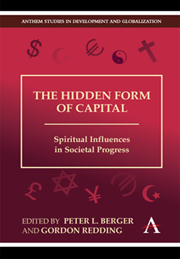Book contents
- Frontmatter
- Contents
- Contributors
- Preface
- Chapter 1 Introduction: Spiritual, Social, Human, and Financial Capital
- Chapter 2 Do Some Religions Do Better than Others?
- Chapter 3 Spiritual Capital and Economic Development: An Overview
- Chapter 4 The Possibilities and Limitations of Spiritual Capital in Chinese Societies
- Chapter 5 How Evangelicanism – Including Pentecostalism – Helps the Poor: The Role of Spiritual Capital
- Chapter 6 Flying under South Africa's Radar: The Growth and Impact of Pentecostals in a Developing Country
- Chapter 7 Importing Spiritual Capital: East-West Encounters and Capitalist Cultures in Eastern Europe After 1989
- Chapter 8 Orthodox Spiritual Capital and Russian Reform
- Chapter 9 Islam and Spiritual Capital: An Indonesian Case Study
- Chapter 10 Separating Religious Content from Religious Practice: Loose and Tight Institutions and their Relevance in Economic Evolution
Chapter 4 - The Possibilities and Limitations of Spiritual Capital in Chinese Societies
Published online by Cambridge University Press: 05 March 2012
- Frontmatter
- Contents
- Contributors
- Preface
- Chapter 1 Introduction: Spiritual, Social, Human, and Financial Capital
- Chapter 2 Do Some Religions Do Better than Others?
- Chapter 3 Spiritual Capital and Economic Development: An Overview
- Chapter 4 The Possibilities and Limitations of Spiritual Capital in Chinese Societies
- Chapter 5 How Evangelicanism – Including Pentecostalism – Helps the Poor: The Role of Spiritual Capital
- Chapter 6 Flying under South Africa's Radar: The Growth and Impact of Pentecostals in a Developing Country
- Chapter 7 Importing Spiritual Capital: East-West Encounters and Capitalist Cultures in Eastern Europe After 1989
- Chapter 8 Orthodox Spiritual Capital and Russian Reform
- Chapter 9 Islam and Spiritual Capital: An Indonesian Case Study
- Chapter 10 Separating Religious Content from Religious Practice: Loose and Tight Institutions and their Relevance in Economic Evolution
Summary
At the time of my first field research in the late 1970s, relatively uneducated Taiwanese villagers used to chastise me with their response to imported ideas of religion. ‘Don't you people know’, I heard over and over, ‘that all religions are really the same? They urge people to do good’. They meant this as a critique of the missionary message of monotheistic Truth, and it reflected the flexibility of their complex, pluralistic, and relatively uninstitutionalized religious context. I agreed with them at the time: religions do share some similar moral messages, and they also generally share a deep involvement in social bonding that can have important implications beyond religion.
Yet, in some ways those villagers were wrong. Moral messages across religions do indeed overlap, but they are not identical. Religions do intertwine with social bonds, but not all in the same ways. Spiritual capital, in brief, cannot be reduced to social capital, especially if we want to understand religion's broader influence on social, political, and economic change. Instead, we have to understand both crucial differences among traditions – levels of institutionalization, forms of socialization, messages and media –and the social contexts in which they evolve.
In this chapter I will discuss the ways that various religions have contributed importantly to Taiwan's market success and eventual democratization, and the evidence that they may play as important a role in the rapidly evolving situation in the People's Republic.
- Type
- Chapter
- Information
- The Hidden Form of CapitalSpiritual Influences in Societal Progress, pp. 41 - 60Publisher: Anthem PressPrint publication year: 2010
- 1
- Cited by



